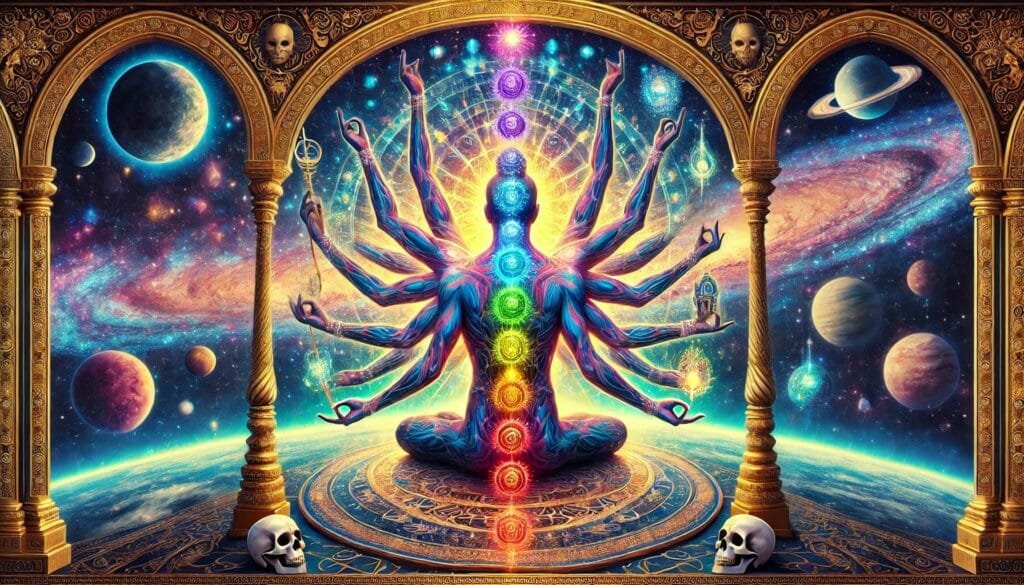The Body as the Temple of Kālī
One of the fundamental tenets of Tantric philosophy is that the body is not just a physical vehicle, but a sacred temple in which the highest divine powers reside. This view is particularly emphasised in the cult of Kālī, the goddess of transformation, where the body is worshipped as the temple of Kālī. The body is the place of manifestation of Śakti, the divine feminine energy, and through appropriate practices this energy can be awakened to become a catalyst for spiritual development.
In the teachings of the goddess Kālī, the body plays a special role, because she is not only the embodiment of cosmic energy, but also of transformation through the human body. In the Tantric tradition, the body is a sacred place to be cherished because it is the place where the divine power within can be awakened. The body is the temple of Kālī where one can experience the deepest spiritual transformations.
Therefore, the body cannot be subordinated or suppressed on the spiritual path, but rather respected and used as a carrier of divine energy. Kālī as the goddess of transformation, who destroys illusions and the bonds of ego, uses the body to bring the soul to the highest divine state.
Tantric practices are meant to transform the body into a temple in which the divine power of Kālī can be awakened. The energy within the body, often referred to as kuṇḍalinī, is dormant and can be activated through appropriate spiritual practices such as mantra recitation, meditation and prāṇāyāma (breath control). This energy rises through the various channels and chakras of the body and eventually merges with divine consciousness, which is the manifestation of Kālī.
The body is therefore not merely a biological structure, but a space in which the highest divine forces are at work. The rituals and practices performed in the worship of Kālī are all designed to purify, strengthen and prepare the body to receive divine energies.
In the tantric tradition of Kālī, respect for the body is often associated with transgressive practices. The practices of left-handed tantra (Vāmācāra), which are also associated with the cult of Kālī, are not afraid to transcend social norms or taboos in order to liberate the individual from the barriers that separate him or her from divine consciousness. These practices often focus on awareness of the sacredness of the body and the reception of divine energy.
The body is thus treated not only as a tool, but as a mediator of sacral power, capable of overcoming the illusion of duality and bondage. As a temple of Kālī, the body is capable of enabling the individual to achieve spiritual freedom, as the body is the mediating space between the world and the divine.
In particular, Kulārṇava Tantra emphasizes the importance of human birth and the unique opportunity that the body provides for spiritual development. The human body is the form in which the soul can attain divine consciousness and ultimate liberation. The body is therefore treated as sacred, as it is a manifestation of divine powers that can be transformed into spiritual energy through appropriate practices. The body is not an obstacle to spirituality, but a tool to be used and cared for properly.
The human body itself is a manifestation of divine consciousness, and by awakening the inner forces, the body becomes a catalyst for spiritual development.
The different parts of the body and their functions have symbolic meaning, and every bodily action has a direct impact on the soul. Maintaining the purity of the body is also essential for maintaining spiritual purity. In the tantric path, the body is often used symbolically to achieve spiritual goals. All activities of the body - be it breathing, movement or speech - are linked to consciousness, and the body is used as a conduit for spiritual energies that awaken divine consciousness.
The body as the temple of Kālī also means that body and soul are inseparable. The body is the energy field of Kālī, where the divine and the human meet. Therefore, it is in the body that not only physical life, but also spiritual development takes place. Only by purifying and strengthening the body can the soul realize its own divine nature, which lies in the power of Kālī.
In the cult of Kālī, the relationship between life and death, body and soul, has a deep symbolic significance. The body perishes, but the divine power is eternal, and through Kālī the individual can be transformed and liberated from the bondage of the physical world.

